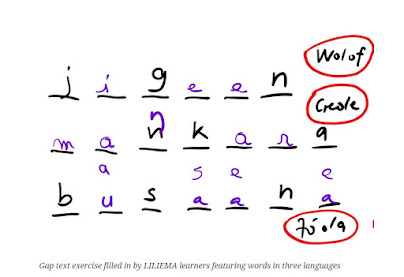In linguistically diverse classes where several languages are spoken as L1, a language inclusive approach is suggested based on the LILIEMA approach. LILIEMA means Language-Independent Literacies for Inclusive Education in Multilingual Areas. Dr. F. Lüpke and her team from SOAS University of London/Helsinki University, which includes local experts, teachers and trainers, introduced LILIEMA in a highly multilingual region in Senegal (due to cohabitation, migration, intermarriage and fostering as widely occurring cultural practices).
2. Using each of the languages and their unique orthography is not feasible in such a low-resource area. Using one language in instruction does not also reflect the actual speaking and writing culture of the learners. Using the LILIEMA approach, Dr. Friederike Lüpke and her team from SOAS University of London/Helsinki University teach basic literacy that builds on the features of multilingualism as actually used in spoken and written form.
3. Applying the LILIEMA approach begins by analyzing the daily informal conversations among the multilingual learners inside and outside the classroom. Emerging from the language analysis would be frequently used words that can be used for reading exercises.
4. Lüpke’s team chose the orthography of one of the national languages and carefully chose the keyword for each sound. Each key word must be among the most frequently used words among the speakers. In other words, the keywords of each letter-sound are not limited to one language only. If adopted in the Philippine setting, the teacher would choose the most common word among Philippine languages. For example, the word “mata” for /m/ is a common term for “eyes” in probably all Philippine languages. The students' names can also be used as a language-neutral keyword (e.g., Toto for /t/; Nina for /n/). In addition to the keywords, the team chose a list of frequently used words in multilingual conversations, including invented words like aba, bab, baab, abba. During literacy instruction, the learners can also contribute words that will be included to expand the word bank for the next batch of students. Open exercises allow learners to write words and texts in their entire repertoire.
For more information see https://liliema.com/
 |
| Source: https://soascrossroads.org/2017/06/26/liliema-language-independent-literacies-for-inclusive-education-in-multilingual-areas-by-friederike-lupke-text-and-miriam-weidl-videos/comment-page-1/ |
No comments:
Post a Comment